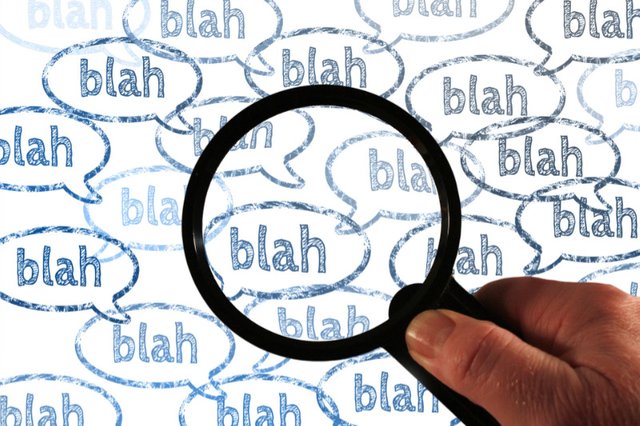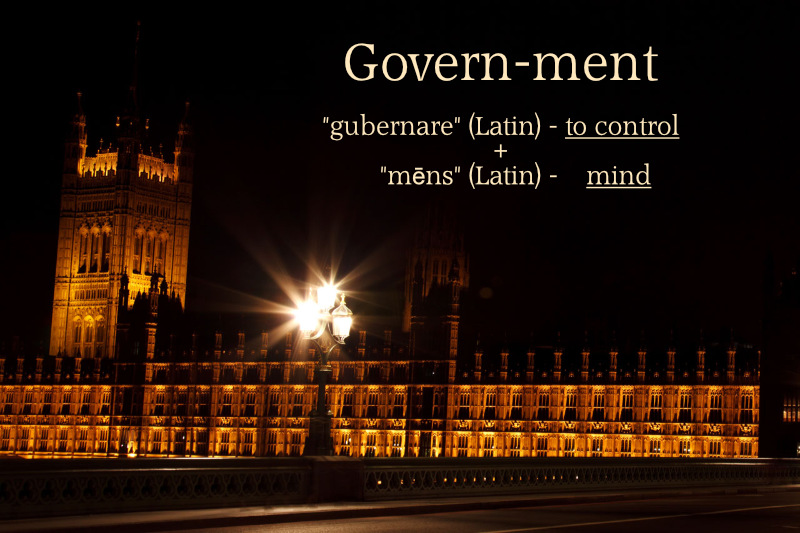A Beginner's Guide to Etymology & the Power of the Word | Part 1
If you find yourself living among other human beings, chances are that language is your predominant tool of expression and communication.
While it is true that language can be used to relay concepts, ideas and perspectives, it can also become a prison for the mind and a barrier to seeing the world in a clear way.
What exactly am I talking about here?
Ever since we were children we have been getting accustomed to a certain way of using words that imply a certain meaning to others around us. And these words have become so common in our everyday lives, that we use them without any further thought on it - unquestioningly and automatically.
But what if I told you, that most words we use every day actually carry a very different meaning altogether? What if I told you that certain terms have a whole myriad of assumptions, paradigms and conditionings attached to them in a way we never even considered?
Welcome to the intellectual minefield of word-magic that is known as etymology.
 Image source: publicdomainpictures.net
Image source: publicdomainpictures.netWhat is etymology?
Simply put, etymology is the study of the origin and true meaning of words. It aims to analyze the original source(s) a term sprang from, in order to comprehend their original meaning and significance. Contemporarily, the term can also refer to the study of the change of a word's meaning over time.
In practice this often means going as far back as ancient Greek, Latin or even Sanskrit to discover how these words came to be, which individual parts they are composed of and what their most likely original meaning was.
For the sake of argument, we might as well start with the very term "etymology". As with anything it is very useful to compare different sources to get closer to the general concensus, or to better find the hidden meaning.
Let's look at the etymology and I'll let you decide.
"Etymology"
&
-logia, ancient greek "λόγος (lógos) > "word" or in a wider sense "to speak", "that which was said"
In the beginning I thought this was a rather trivial area of inquiry. Why would I be interested in words? I never liked semantics, I felt it would be rather pointless to spend my time on the subject. That is because I assumed words to mean what I thought they meant.
In the vast majority of cases however, this is far from the truth.
Not only that - the further you dive into the field of etymology and start to analyze your own use of words, the more it will begin to dawn on you how deep this rabbit hole can go, why it is so seldomly talked about and how great the impact on our own lives actually is.
 Image source: publicdomainpictures.net
Image source: publicdomainpictures.netInquirer's precautions
To kickstart our excursion into language I want to share some of the gems I have found along my journey, gems that will help you better decide whether this topic is worth your time and effort. There is good reason one can spend his whole life just researching this one topic alone - you can study it at universities and whole dictionaries have been written on the subject, so I will be merely scratching the surface here.
A word of warning:
For some terms it will take a lot of effort to uncover the hidden meaning. It can be quite a detective's job and though I am doing my best here and have invested a lot of time, I would love for people with a better understanding to correct me if I made a mistake. Always do your own research, and take this article merely as a starting point.
Also you must never simply accept the prescribed interpretation of a term. If you do, you might as well turn on your TV again and stop reading right here. Meanings have been largely hijacked, and a prime instrument of the system is to give explanations in order to satisfy the gullible, no matter how sound or logical the explanation (excuse) actually is.
Disclaimer over ;)
Digging through the seemingly familiar
So for kicks, we will start with the ever-present and unanimously-understood term government. Everybody uses it, everybody has an opinion on it, and everybody seems affected by it. But what does it mean?
What is "government"?
Well, everybody assumes to know... but do we really?
Let's look at the etymology and I'll let you decide.
"Government"
&
-ment borrowed from old French, derived from Latin mente of the ablative singular mēns > "mind",
taken from Proto-Indo-European méntis ("thought")
|wiktionary.org, wiktionary.org |
 Image source: publicdomainpictures.net
Image source: publicdomainpictures.netPretty wild, huh?
A good rule of thumb is to go as far back as you can in your sources when you look at the etymology of a word. For this reason, an etymological dictionary from the late 1800's will always be closer to the truth than the latest result on Google. Language is undergoing constant change, and a lot of that change is not organic but planned.
If you don't believe me, ask your grandma what an SJW is. Or your grandpa what is meant by the Alt-Right. These are terms that did not exist decades ago, and they have become concept-terms for people to get angry about and take position over.
These are made terms to imply a certain range of interpretation and to bind people's focus on a fixed, remotely-seeded concept!
As you can imagine: terms that are deemed violently controversial carry a high potential to have a hidden meaning to them, going back to different roots. However, the romanic languages are all connected and closely related, so we can figure out these terms' source with enough patience and effort. A term will morph and fluctuate over time in different cultures, often going back to the same original source.
Ok, let's look at another term.
How about "antibiotic"?
I bet by this point you can already tell that your mind has been shifting gears so to speak, and that you can suddenly see words with a more present focus, words that have been in your vocabulary for a long time.
Antibiotic.
Can you guess what this word means - or rather - what it signifies?
"Antibiotic"
&
ancient Greek βιωτικός (biotikos) > "to live, produced by life, (pertaining to) life"
|etymonline.com, wiktionary.org |
 Image source: publicdomainpictures.net
Image source: publicdomainpictures.net... I know.^^
It's almost too good to be true.
And it was right there in front of our eyes - all this time. Guess that's what people mean when they say "hidden in plain sight".
But of course, most educated people will roll their eyes when you bring this up and they will try to explain this away by saying the term would "only" stand for "medicine against-malicious-microorganisms" not against life per se. Yeah right, good boy, sit down, you get an A for regurgitating what you're supposed to know. And don't you ask any of these "pointless questions" again if you want your degree!
There are explanations for anything. If one is easily swayed.
Another one?
What do you think a mortgage is? And what do you think was meant by that term, originally?
"Mortgage"
&
13th century Old French (gage) > "pledge, guarantee, wager"
|english-ingles.com, etymonline.com |

The more I looked into how language has more than one meaning and function, the more I understood what people meant when they claim that we live in a magic world, and that word-magic dominates contemporary life more than anything else.
Ok, so what's next?
The next installment in this series will deal with interpretation, and how "official meaning" is used to discredit any non-official interpretation through the sheer dominance of its reach and impact, how we become unwillingly complicit in keeping the power mechanisms alive and what words have to do with all of that.
How about you?
What terms do you use a lot, that you have never actually looked at thoroughly?
If you would like some "home-work" ;) start watching your own use of words for the next week or so, and try to catch yourself when a whole different meaning dawns on you. More often than not, there is something to be found there.
I would love to read about your "A-HA"- moments and revelations - please feel free to post them in the comments, as well as anything else you want to share in this regard.
For now, I will leave you with a quote:
"The basic tool for the manipulation of reality is the manipulation of words.
If you can control the meaning of words,
you can control the people who must use the words."
- Philip K. Dick -
Thanks for stopping by and investing your time.
Love.
I was digging through your posts and found this. Funny how @iamstan and I were talking about "semantics" and here you are, already wrote about it.
The words are so twisted now it even cost too much to get an old dictionary or an old Black's Law dictionary.
Can't trust the "common" definition nowadays you have to really dig. I'm going to read the part 2 now.
So cool you mention Black's law!!!
You definitely are not a beginner, hehe. Should have known at first sight. Definitely followed. Thank you for reaching out to me, I dig smart people and their viewpoints.
Heh. I knew squat before I met @iamstan. We started our friendship/relationship with him teaching me truths, looking for it and questioning things.
It's still a struggle for me to this day but everyday we're learning..I mean unlearning..
Black's Law! Yes, I would like to have one of those old editions...
Part 2 of this series can be found here:
https://steemit.com/libya/@paradigmprospect/a-beginner-s-guide-to-etymology-and-the-power-of-the-word-or-part-2-or-authority-of-interpretation
I am not so good at languages other than english but I am always trying to learn more. This is a good read I wish I could study a knowledgable translation into other languages to pick up the equivalent concepts. Mortgage meaning"death pledge" explains to me so much about the French philosophy.
thank you for dropping your thoughts godo!
I have encountered that a European tongue is sometimes better prepared to learn other languages, though there are certain ways to learn language with way less effort than we do in school.
I have listened to Pimsleur's language course in Spanish before, and it's pure magic. You can basically tell a stranger that your neighbor lost his hat on his last walk to the beach at 3AM, after like 30 days of learning. It was mindblowing.
On a more general note, we tend to overemphasize the hardcore "learning" part - writing and reading, as well as syntax. Kids do not learn that way, they learn the sounds and they learn to speak first, THEN they go on to learn about writing.
A huge part of this is passive learning and listening, like kids do. If you want to eventually learn spanish for example, just let some spanish TV run in the background all the time (and I never recommend wtching TV ahahaha). Certain phrases and expressions will become clearer over time, and the brain can start to separate the barrage of sounds into single recurring words. As humans we can't help but learn, only we have been thoroughly indoctrinated in a way that is not beneficial to that end.
I can also say that German is a magical language in the sense, that MANY of such examples as listed in the article can be found in German, it has been described as a language very close to the source. A magical language. A language that tries to pin down the un-down-pinnable ;)
Deutsch (the german word for German) contains the word deut- which is the same root as 'deuten', meaning to interpret. And English is also full of hidden meanings.
Have a great weekend!
Thanks for the information, these seem like helpful suggestions. For me the epistemology of the creation of words is the best way to learn them, in other words find why, when, and where they were created.
You have a good week as well @paradigmprospector, I look forward to more linguistics and epistemology with you!
Great posts. Words are indeed a very interesting subject. They say words cast spells, which is why learning to spell in school the way are taught is required.
Thank you and YES, spelling is not called spelling for no reason.
Same as cursing. But I see you are very familiar with these aspects already, I'm glad to have stumbled upon your channel a while back, I will thoroughly enjoy our exchange of wisdom and the sharing of uncommon perspectives!
Love